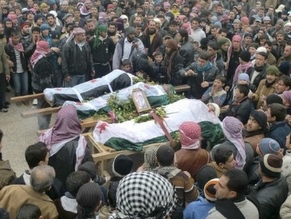|
World Jewish News

Anti-Assad regime demonstrators attend funeral near northern province of Idlib, Feb. 6, 2012. Photo by: Reuters
|
Syrian forces kill at least 67 civilians in Homs, activists say
08.02.2012, Israel and the World Syrian forces thrusting into the rebellious city of Homs on Wednesday killed at least 67 civilians, including three families slain in their homes by militiaman loyal to President Bashar Assad, activists said.
The onslaught on Homs, one of the bloodiest of the 11-month-old revolt against Assad, has not relented despite a promise to end the bloodshed that the Syrian leader gave to Russia, which saved Damascus from UN Security Council action on Sunday.
A Turkish newspaper close to the government said Turkey, which has taken a strong stand against former ally Assad, planned to organize a conference with Arab and Western governments in Istanbul. The conference would be part of a broader Turkish initiative that may be outlined on Wednesday.
Turkey's Prime Minister Recep Tayyip Erdogan will discuss the situation in Syria in a phone call with Russia's President Dmitry Medvedev later on Wednesday, Turkey's Foreign Minister Ahmet Davutoglu told broadcaster NTV in an interview.
Erdogan said on Tuesday his country was preparing a new initiative with those countries who oppose the Syrian government and described China's and Russia's veto of a UN resolution on Syria a "fiasco".
In the latest assault on Homs, troops fired rockets and mortars while tanks entered the Inshaat neighborhood and moved closer to Bab Amro, the district hardest hit by bombardments that have killed at least 150 people in the last two days, activists in the city and opposition sources said.
"Electricity returned briefly and we were able to contact various neighborhoods because activists there managed to recharge their phones. We counted 47 killed since midnight," activist Mohammad Hassan said by satellite phone.
Russian Foreign Minister Sergei Lavrov said countries with influence over the Syrian opposition should press them to enter a dialogue with Assad, comments that made clear Moscow had no immediate intention of abandoning its long-time ally.
Lavrov was speaking in Moscow a day after he met Assad in Damascus, where he said both nations wanted to revive an Arab League monitoring effort that was suspended due to violence.
The outcome of any talks on ending the bloodshed in Syria must not be predetermined, Lavrov said.
Syrian opposition figures, who said Lavrov had brought no new initiative, spurn Assad's promises of reform as meaningless while his troops are killing civilians and say he must go.
Walid al-Bunni, a senior member of the opposition Syrian National Council (SNC), dismissed Lavrov's dialogue proposal.
"The Arab initiative is clear. Assad must step down and Syrians will then be ready to sit together at a table with whoever succeeds him to discuss a democratic transition," the head of the SNC's foreign policy committee told Reuters.
Western and Arab states frustrated by the Russian and Chinese vetoes of their draft UN resolution are seeking to isolate Assad and bolster those opposed to his 11-year rule.
Pro-Assad militiamen shot dead at least 20 civilians in Homs when they stormed their homes on the outskirts of opposition areas overnight, the Syrian Observatory for Human Rights said.
Rami Abdelrahman, who heads the British-based Observatory, told Reuters the unarmed victims were a family of five, one of seven and one of eight.
There was no immediate comment from Syrian authorities and the report could not be verified. The authorities have placed tight restrictions on access to the country.
Assault on Homs
Activist Hassan said bombardment intensified in the early morning, targeting the Sunni Muslim districts of Bab Amro, al-Bayada, al-Khalidiya and Wadi al-Arab, all hostile to Assad, whose minority Alawite sect has dominated Syria for five decades.
"Mortar and rocket fire has subsided, but heavy machineguns and anti-aircraft guns are still strong," he said. "Tanks are in main thoroughfares in the city and appear poised to push deep into residential areas."
The state news agency SANA said "armed terrorist groups" had attacked police roadblocks in Homs and fired mortar bombs at the city, with three falling on the Homs oil refinery, one of two in Syria. It gave no details of any damage.
SANA said funerals had been conducted on Tuesday for 30 members of the security forces.
Army deserters and insurgents are fighting back against Assad's violent response to what began as a mostly peaceful protest movement and now threatens to slide into sectarian civil war.
Diplomatic pressure
"Assad is seeing the civilized world turn against him and he thinks he will win if he uses more brutal force before the world could act," said Catherine al-Talli, a senior SNC member.
The attack on Homs has intensified Western and regional diplomatic pressure on Assad. The six members of the Gulf Cooperation Council recalled their ambassadors from Damascus on Tuesday and expelled Syrian envoys from their own capitals.
Australian Foreign Minister Kevin Rudd called in Syria's charge d'affaires Jawdat Ali on Wednesday and told him it was time for Assad to "find an exit strategy before the situation in Syria degenerates further and more lives are lost".
Russia's veto of the Security Council resolution on Syria went beyond protecting an ally and arms buyer, analysts said. It showed Moscow's determination to crush what it sees as a Western crusade to use the United Nations to topple unfriendly governments.
The same holds true for China, which followed Russia's lead and joined Moscow in striking down a European-Arab draft resolution that would have endorsed an Arab League plan for Assad to transfer power to his deputy to prepare free elections.
"There are all sorts of political interests involved but there is also a basic difference about whether the international community should be involved in internal conflicts against the will of the government," said David Bosco of American University in Washington.
Haaretz.com
|
|
